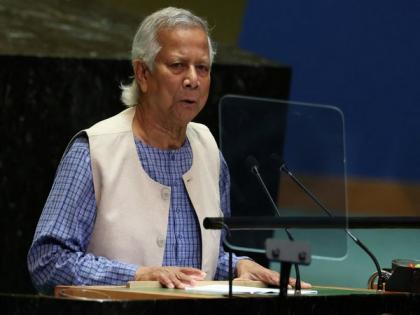Bangladesh secures 20 percent tariff rate after final talks with US, Yunus says 'diplomatic victory'
By ANI | Updated: August 1, 2025 10:19 IST2025-08-01T10:12:54+5:302025-08-01T10:19:38+5:30
Dhaka [Bangladesh], August 1 : Bangladesh has secured a 20 percent tariff rate after final talks with the US ...

Bangladesh secures 20 percent tariff rate after final talks with US, Yunus says 'diplomatic victory'
Dhaka [Bangladesh], August 1 : Bangladesh has secured a 20 percent tariff rate after final talks with the US comparable to its key apparel-sector competitors such as Sri Lanka, Vietnam, Pakistan, and Indonesia, which received rates between 19% and 20%.
"As a result, Bangladesh's relative competitiveness in apparel exports remains unaffected," Bangladesh's Chief Adviser's Press Wing said in a statement on Friday.
"We negotiated carefully to ensure that our commitments aligned with our national interests and capacity," said Dr. Khalilur Rahman, Bangladesh's National Security Advisor and lead negotiator.
"Protecting our apparel industry was a top priority, but we also focused our purchase commitments on U.S. agricultural products. This supports our food security goals and fosters goodwill with U.S. farming states."
"Today, we successfully avoided a potential 35% reciprocal tariff. That's good news for our apparel sector and the millions who depend on it. We've also preserved our global competitiveness and opened up new opportunities to access the world's largest consumer market," Dr. Rahman added.
"We proudly congratulate the Bangladesh tariff negotiators on securing a landmark trade deal with the United States, a decisive diplomatic victory," Bangladesh Chief Adviser Muhammad Yunus said in a message.
"By reducing the tariff to 20%, 17 points lower than anticipated, our negotiators have demonstrated remarkable strategic skill and unwavering commitment to safeguarding and advancing Bangladesh's economic interests," it added.
"They have been working relentlessly since February and navigated successfully through a complex negotiating process involving tariff, non-tariff, and national security matters. The agreement they negotiated preserves our comparative advantage, enhances our access to the world's largest consumer market, and safeguards our core national interests," Yunus said.
"This achievement not only underscores Bangladesh's rising strength on the global stage but also opens the door to greater opportunities, accelerated growth, and lasting prosperity. The future of Bangladesh is undeniably bright. Today's success stands as a powerful testament to the nation's resilience and its bold vision for a stronger economic tomorrow," the Chief Adviser said.
Bangladesh has already signed a deal to purchase 700,000 tonnes of wheat annually from the US. Plans are underway to increase LNG imports and to purchase 25 Boeing aircraft from the US, Bangladesh's local media reported.
A Bangladeshi official who participated in the talks toldthat the US side has requested Bangladesh to import military equipment from their country.
"We said, we are diversifying the purchase of military equipment. We are also buying military equipment from Turkiye and Eastern European countries. We also want to buy from the United States. The quality of US military equipment is good but the price is high. If we can, we will buy from the United States," the official said.
Bangladesh will also increase import of soybean and cotton from the United States to reduce the trade gap of USD 6 billion, he said.
"The United States has expressed concerns that Bangladesh is moving into China's orbit. We have said that China is our neighbouring trading partner. We are not part of any circle. The United States has requested Bangladesh to reduce its dependence on some countries," the official said.
President Donald Trump announced new tariff rates up to 41% on imports from 70 countries, just ahead of the August 1 deadline for finalizing bilateral trade agreements.
These agreements extend beyond tariff adjustments to include domestic policy reforms that the Trump administration views as contributing to trade imbalances. They also address broader economic and national security concerns. As part of the negotiations, countries were required to make explicit commitments to purchase U.S. goods to help narrow trade deficits.
Given the scope of issues involved, the negotiation process has been complex and time-consuming. Tariff relief was tied not only to reductions in duties on U.S. exports but also to a country's willingness to address U.S. concerns on non-tariff barriers, trade imbalances, and security matters.
President Trump's executive order made clear that each country's tariff rate would reflect the depth of its commitment across all these areas.
Earlier, two days ahead of the July 9 deadline, US President Donald Trump issued a letter to Bangladesh, imposing a 35 percent tariff. According to the letter, the tariff will take effect on August 1.
Disclaimer: This post has been auto-published from an agency feed without any modifications to the text and has not been reviewed by an editor
Open in app